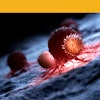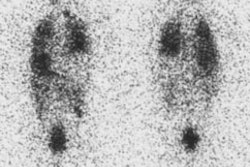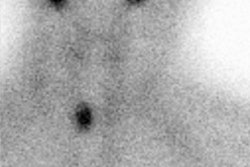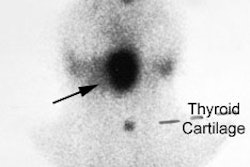J Nucl Med 2002 Feb;43(2):207-9
False-positive findings on (131)I whole-body scans because of posttraumatic
superficial scabs.
Regalbuto C, Buscema M, Arena S, Vigneri R, Squatrito S, Pezzino V.
Nonspecific (131)I uptake may affect both the specificity and the accuracy of
whole-body scanning (WBS) performed after (131)I administration in the follow-up
of thyroid carcinoma after thyroidectomy. We report a newly identified cause of
false-positive WBS findings: posttraumatic superficial scabs. METHODS: Four
patients who underwent thyroidectomy for differentiated thyroid carcinoma were
studied after therapeutic administration of 3,700 MBq (131)I. RESULTS: WBS
revealed an area of uptake in the lower limbs, in a site corresponding to a
slight abrasion of the skin that had incidentally occurred between a few hours
before and 24 h after radioiodine administration. In 2 patients, a radioiodine
concentration in the scab was shown by the disappearance of the radioactivity in
the leg after removal of the scab and by detection of radioactivity in the
collected material. CONCLUSION: Posttraumatic superficial scabs may be a cause
of false-positive WBS findings. High (131)I doses, although providing increased
sensitivity, may also increase the number of false-positive results.




